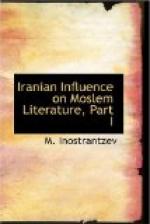Afshin replied; “Just in the way they used to write to my father and grandfather.”
“Then tell us the way.”
“No, I won’t.”
“Do not the people of Ashrushna write to you in such and such a way?”
“Now, does this not mean in Arabic, ’to the high God from his slave so and so?’”
[Ibn Khaldun is here clearer than Tabari. The term used was Khoday which in Persian meant Lord, applicable equally to God and any high dignitary. The original ‘Pahlavi’ title of the Shahnameh was Khodaynameh.]
“Yes.”
Muhammad Ibn Abdal Maliq asked upon this, “Do they tolerate such a thing? For what greater blasphemy would be left to Pharaoh to commit who suggested to his people ’I am your God the Highest.’?”
Afshin replied, “This was the custom of the people in my father’s and grandfather’s times and it was also the custom with me before I embraced Islam. And then I did not like that I should lower myself before them. For then I should have lost their allegiance and the obedience that they owed me.”
Upon this Ishaq Ibn Ibrahim Ibn Musab said, “Fie, fie on you, Hyder.”
[Afshin is sometimes referred to as Hyder.]
Then turned up Mazyar the chief of Tabaristan and Afshin was asked whether he knew him. He said “No.”
Mazyar was asked if he knew Afshin.
Then they told him that this was Mazyar.
“Yes, I know him now.”
“Did you ever have correspondence with him? No.”
Then turning to the Marzban they asked, “Did he ever write to you?”
“Yes,” said Mazyar, “His brother Khash used to write to my brother Quhyar to the effect that this splendid religion of theirs will have help from nobody except himself, Quhyar and Babak.”
[In the sequel Tabari relates how when Afshin’s house was searched, after he was starved to death, among other incriminating articles a book was discovered sumptuously bound and bedecked with gems which related, to the old faith of Iran.]
APPENDIX V
NOELDEKE’S INTRODUCTION TO TABARI.
[The Arabs have long been credited with maintaining learning and civilisation in general when Europe was slumbering in its dark ages. History as a science was rarely known even to the gifted Hindus. The Arabs cultivated it with peculiar enthusiasm. Wustenfeld has collected the lives of 590 historians, the first of whom died in the year 50, and the last was born in 1061 A.H. But it is now proved beyond all doubt that many of these writers were Persians who employed the Arabic language and that the art of Arab annalists had its root in the archives of the Sasanians. We owe this discovery to Goldziher and Von Kremmer in the first instance, and to Brockelmann, Browne, Blochet and Huart who have done ample justice to the Iranian element in Arab culture. One of the best of these histories is by Tabari. Noeldeke translated in 1879, the portion relating to the Sasanians into German, and added footnotes to his translation, which are a mine of information on pre-Moslem Persia. The introduction which he wrote to his translation is equally valuable especially for the light it throws on the sources of Firdausi. The following is a translation of that German introduction by Noeldeke.




